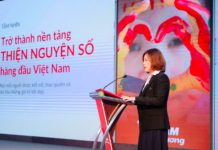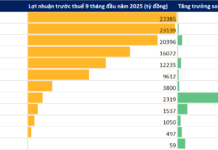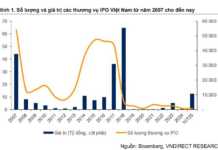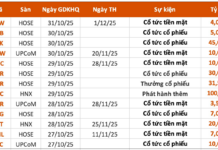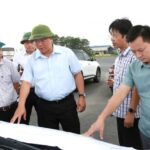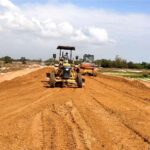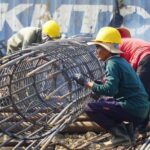Prime Minister Pham Minh Chinh Chairs a Meeting of the Government’s Standing Committee with Enterprises Constructing National Key Projects
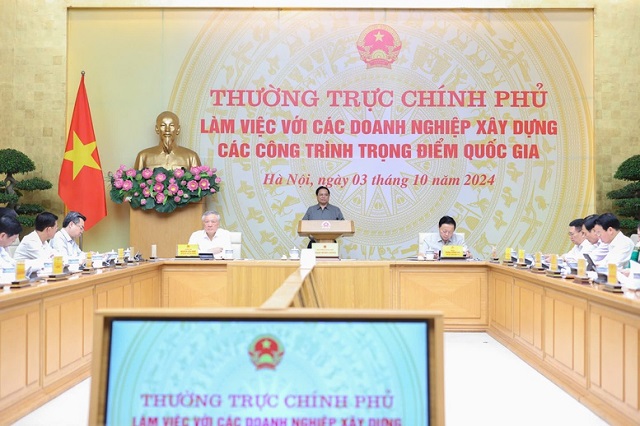
On the afternoon of October 3, Prime Minister Pham Minh Chinh chaired a meeting of the Government’s Standing Committee with enterprises constructing national key projects.
Mr. Bui Xuan Dung, Deputy Minister of Construction, said that during the period of 2021-2024, the construction industry faced numerous challenges due to a stagnant real estate market, a decrease in the number of new investment projects and constructions, and a surge in construction material prices at certain times. There were also more obstacles and inconsistencies in the regulations on construction investment, which were caused by rapid changes in reality. These challenges could be categorized into four main groups:
The contractors faced difficulties in site clearance and the relocation of technical infrastructure works, mainly for transportation projects. These tasks were not carried out in a timely manner to match the construction implementation progress, or the sites were uneven, causing complications in construction, foundation treatment, and affecting the completion schedule and quality assurance.
The simultaneous implementation of multiple key projects, especially in the Mekong Delta region, led to a shortage of certain construction materials such as filling sand, 1×2 rocks, and graded crushed stone. Some licensed mines could not meet the projects’ demands, and reduced extraction capacity made it even more challenging for contractors to find construction material sources. Additionally, there was a shortage of construction workers, particularly skilled ones, which resulted in increased construction labor costs and difficulties for construction contractors in finding and mobilizing human resources.
To address the challenges related to construction materials, the Government has applied a special mechanism for mineral exploitation permits for construction materials in the construction of several sections of the North-South expressway in the Eastern region during the period of 2017-2020. However, the Ministry of Construction acknowledged that as this was the first time such a special mechanism was implemented, the current legal system could not fully accommodate it, leading to implementation difficulties and inconsistencies among some projects.
“In carrying out the task assigned by the Prime Minister in Official Dispatch No. 02/CD-TTg dated January 9, 2024, regarding guiding the Ministry of Transport and localities in determining material prices at mines, the Ministry of Construction has proactively coordinated, inspected, and surveyed project sites. An inter-ministerial working group was established, and numerous guiding documents have been issued. Up to now, the task of determining material prices at mines under the special mechanism has been basically resolved. However, through exchanges and grasp of the situation, the Ministry of Construction has recorded some difficulties and obstacles at some mines in determining compensation costs and extraction permit procedures, which are under the guidance of the localities,” said Mr. Bui Xuan Dung.
Furthermore, for some urgent projects (such as the expressway project), the quality of the design dossiers was not up to par, with many unreasonable points that required time-consuming adjustments, supplements, and reviews during the construction process. During the design process, the investors did not consider the direction of using materials and equipment that ensure commercial competitiveness and market availability to avoid monopoly situations, causing difficulties for construction contractors in purchasing materials and equipment.
Lack of Site Clearance, Materials, and Price Discrepancies…
Senior Colonel Khuong Tat Thang, Deputy Commander and Vice Chairman of the Board of Directors of Truong Son Construction Corporation, shared that the enterprise is currently implementing national key projects with a total contract value of more than VND 31,000 billion. However, they are facing challenges related to policies and mechanisms, such as slow final settlement by investors, sudden increases in material prices during construction, which significantly affect production and business efficiency, and mines granted for exploitation under the special mechanism failing to meet the committed reserves.
“The material prices in the localities are always higher than the prices in the published price lists, but there is no regulation or supervision of the suppliers. In the process of implementation, the contractors have to purchase at prices many times higher than the approved prices, greatly affecting the progress and production efficiency. Notably, most of the North-South expressway packages in the period of 2021-2025 have volume changes compared to the signed contracts, with many provisional unit prices, but the approval procedures go through many intermediate levels of presentation, consideration, and appraisal, affecting the disbursement of completed volumes for the contractors,” reported Senior Colonel Khuong Tat Thang, Deputy Commander and Vice Chairman of the Board of Directors of Truong Son Construction Corporation, to the Prime Minister.
The representative of Truong Son Construction Corporation proposed that the Prime Minister, ministries, and branches present at the meeting review the policies and regulations in the construction field to make reasonable adjustments that match the reality, such as adjusting construction norms, unifying construction contract models, and stipulations on contract penalties…
At the same time, they should also resolve difficulties in site clearance, create conditions to ensure the source of filling soil and sand for the projects, and soon determine the sand price at the mines according to the special mechanism to serve as a basis for payment and disbursement.
Mr. Ho Minh Hoang, Chairman of the Board of Directors of Deo Ca Group – the investor and general contractor of 12/29 national key projects, reported to the Prime Minister the difficulties in site clearance for four expressway projects (Dong Dang – Tra Linh, Huu Nghi – Chi Lang, Quang Ngai – Hoai Nhon, and Ha Giang – Tuyen Quang).
“For all four expressway projects that Deo Ca Group is constructing, site clearance is slow, and the localities reported to the Prime Minister that the site clearance rate is guaranteed. Still, in reality, many positions are uneven, and many locations lack access roads,” said Mr. Ho Minh Hoang.
While appreciating the Ministry of Construction for promptly amending and supplementing the system of construction norms and issuing guidance on determining material prices at mines according to the special mechanism applied for the first time, Mr. Ho Minh Hoang assessed that the system of construction norms is still lacking norms for tunnels (road, railway, …), and the ministries and branches need to continue reviewing, updating, supplementing, and adjusting to ensure correctness and sufficiency, matching the current construction methods.
Notably, Deo Ca Group proposed to the Prime Minister to create a mechanism for Vietnamese construction enterprises to soon become self-reliant in investing, producing, and constructing works requiring high technology and techniques (railways, metros, intelligent transportation, smart cities, …). For large-scale projects, it is necessary to consider giving priority to enterprises with management capabilities, those that have produced specific products, organized the connection and training for other enterprises, and those that are located in the localities where the projects pass through.
“In the past time, many units have participated in the construction of large packages, which has not been seen before in the North-South expressway projects in the period of 2021 – 2025. Therefore, after 2025, the human resources, machinery, and equipment of these enterprises will be idle. Thus, in implementing the high-speed railway project, the State should create conditions for these construction enterprises to approach and implement, contributing to the development of the country,” proposed Mr. Ho Minh Hoang.
Mr. Nguyen Xuan Truong, Director of Xuan Truong Construction Company, suggested that the localities proactively seek material sources for the projects passing through their areas, like Ha Tinh province did recently. He believed that the most important factor is the mindset. The localities need to coordinate with each other and collaborate with the ministries and branches instead of reporting everything like they do now.
Directly Solving Many Difficulties
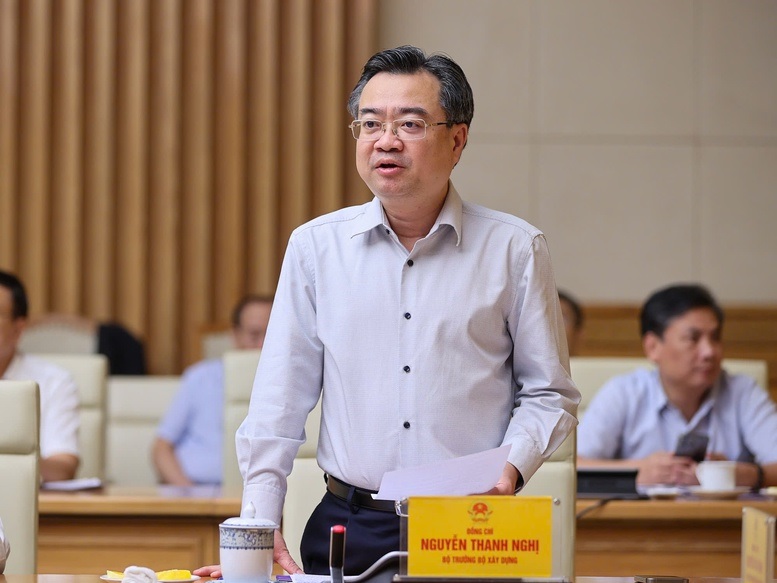
Responding to some difficulties faced by the contractors at the conference, Minister of Construction Nguyen Thanh Nghi informed that regarding the obstacles in construction contracts that the contractors reflected, the Law on Construction has basically stipulated the provisions on construction contracts. Still, there are some impracticalities in reality, so the Ministry of Construction will continue to review and amend them to suit the actual situation and accelerate the disbursement pace for the contractors. The Ministry of Construction will also coordinate with the Ministry of Finance to improve the regulations to ensure unified and consistent payment and final settlement for the contractors, respecting the maximum freedom of the subjects and having clearer provisions to protect the construction contractors.
At the same time, the Ministry of Construction will work with the Ministry of Finance to improve the contract models, review the regulations on ensuring the implementation of the contract, and increase the bank guarantee instead of the current cash guarantee. “The Ministry will also promptly supplement the unit prices for new construction technologies and materials and the unit prices that are not yet realistic, as reflected by the contractors. In the long term, the Ministry of Construction will study the direction of package norms instead of the current single-unit norms,” informed Minister Nghi.
Regarding the proposal to reduce the warranty period for works after completion to below 5%, Deputy Minister of Finance Bui Van Khanh affirmed that the law on construction contracts does not stipulate the retention of 5% or 10% of the construction value for warranty, and if there is such a provision in the contract, it is due to the agreement between the investor and the contractor.
“Article 19 of Decree No. 37/2015/ND-CP stipulates that ‘The assigning party must fully pay (100%) the value of each payment to the receiving party after deducting the advance payment and the warranty amount according to the agreement in the contract, except for cases where the parties have other agreements. It is strictly forbidden for the assigning party not to pay in full or not to pay on time according to the agreements in the contract to the receiving party.’ Point c, Clause 2, Article 46 of Decree No. 37/2015/ND-CP stipulates that ‘Warranty assurance can be made in the form of a guarantee or other forms agreed by the parties, but priority must be given to the form of a guarantee.’
Thus, the law on construction contracts does not stipulate the retention of a certain amount of money for final settlement, but only for warranty if the guarantee form is not applied. The determination of the value, management, and use of the retained money for warranty in case the guarantee form is not applied shall comply with the current financial regulations, ensuring the right purpose,” affirmed Deputy Minister of Finance Bui Van Khanh.
Deputy Minister of Transport Nguyen Danh Huy shared that the transport industry is very grateful to the contractors for their efforts during this time. He also shared a “very real number” according to the VCCI’s announcement on four criteria (revenue, profit, total assets, and capitalization). The large contractors present at today’s conference are not in the TOP 100, and only one enterprise is in the ranking due to a joint venture with a foreign partner. This shows that construction enterprises in fundamental fields like transportation and construction make significant contributions but are not in the super-profit sector.
Regarding the enterprises’ opinions on forming large enterprises and ethnic enterprises that are large enough to be self-reliant, as directed by the Prime Minister, according to Mr. Huy, with the upcoming high-speed railway project, there will be binding conditions for fields that can produce domestically to use domestic enterprises as joint ventures, not subcontractors.
In addition, Deputy Minister Nguyen Danh Huy also mentioned that the announcement of unit prices by the localities also significantly affects the contractors. “There are some unreasonable unit prices, such as the unit price of a 4kg steel drill in Quang Ngai province being VND 55,000, which is not enough to cover the cost of steel, let alone the cost of manufacturing. Therefore, it is necessary to review the unit prices of the localities,” said the Ministry of Transport. The Ministry of Transport will receive the contributions of the contractors and coordinate with the ministries and branches to continue reviewing and removing the inconsistent regulations in the shortest time.
Expanding Ca Mau Airport to Welcome 1 Million Annual Visitors with an Investment of Over 860 Billion VND
The Vietnamese province of Cà Mau is set to invest over 860 billion VND in a game-changing infrastructure project. With a vision to transform local connectivity, the funds will be utilized to acquire land and embark on an ambitious expansion of the Cà Mau Airport. The project aims to elevate the airport’s capacity to accommodate 1 million passengers annually, setting a new benchmark in regional aviation and unlocking unprecedented growth opportunities.
Unlocking Transport Projects: The Chairman’s Initiative
Chairman of the People’s Committee of Vinh Phuc Province, Tran Duy Dong, has urged relevant departments, sectors, and local authorities to focus on addressing challenges and obstacles, particularly in the compensation and site clearance process, for three crucial transportation projects in the province.
The Capital’s $50 Million Road: A 6-Year Long Journey to Success in Long Bien District
The construction project, a 1.5 km-long road connecting Nguyen Van Cu Street to the end of the Ngoc Thuy resettlement area (Long Bien District), is in its final stages of completion. With a total investment of VND 1,200 billion, the road is set to open to traffic by October, offering smoother connectivity and improved infrastructure for the community.
The Great Land Fill: Unlocking Public Investment for Quang Nam’s Stalled Projects
The province of Quang Nam is facing significant challenges in completing its key projects due to a shortage of fill dirt and construction sand, causing significant delays. Despite the province’s aggressive implementation of solutions to expedite the disbursement of public investment capital and eliminate unnecessary projects, the disbursement rate still falls short of the planned target.
The Art of Expediting: A Nudge from the Top to Spur Investment Action
The Ho Chi Minh City People’s Committee has issued a warning to districts, counties, and project management units regarding their 2024 public investment disbursement plans. The plans fell short of the expected 95% ratio, prompting the committee to emphasize the importance of timely and efficient allocation of funds for the city’s development projects.






